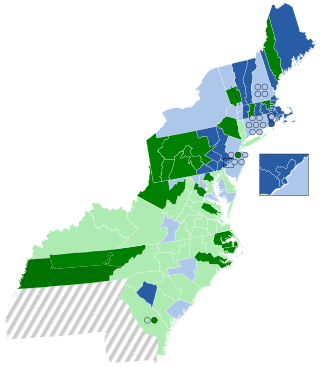
The 1942 United States House of Representatives elections were elections for the United States House of Representatives to elect members to serve in the 78th United States Congress. They were held for the most part on November 3, 1942, while Maine held theirs on September 14. This was the first election after the congressional reapportionment based on the 1940 Census, and was held in the middle of President Franklin D. Roosevelt's third term. With involvement in World War II, it was the first wartime election in the United States since 1918.

The 1828–29 United States House of Representatives elections were held on various dates in various states between July 9, 1828 and October 5, 1829. Each state set its own date for its elections to the House of Representatives before the first session of the 21st United States Congress convened on December 7, 1829. Elections were held for all 213 seats, representing 24 states.
The 1826–27 United States House of Representatives elections were held on various dates in various states between July 3, 1826 and August 30, 1827. Each state set its own date for its elections to the House of Representatives before the first session of the 20th United States Congress convened on December 3, 1827. They occurred during John Quincy Adams's presidency. Elections were held for all 213 seats, representing 24 states.
The 1818–19 United States House of Representatives elections were held on various dates in various states between April 26, 1818 and August 12, 1819. Each state set its own date for its elections to the House of Representatives before the first session of the 16th United States Congress convened on December 6, 1819. They occurred during President James Monroe's first term. Also, newly admitted Alabama elected its first representatives in September 1819, increasing the size of the House to 186 seats.

The 1796–97 United States House of Representatives elections took place in the various states took place between August 12, 1796, and October 15, 1797. Each state set its own date for its elections to the House of Representatives. The size of the House increased to 106 seats after Tennessee became the 16th state to join the union. The first session of the 5th United States Congress was convened on May 15, 1797, at the proclamation of the new President of the United States, John Adams. Since Kentucky and Tennessee had not yet voted, they were unrepresented until the second session began on November 13, 1797.

The 1794–95 United States House of Representatives elections were held on various dates in various states between August 25, 1794, and September 5, 1795 (Kentucky). Each state set its own date for its elections to the House of Representatives before the first session of the 4th United States Congress convened on December 7, 1795. They were held during President George Washington's second term. Elections were held for all 105 seats, representing 15 states.

The 1790–91 United States House of Representatives elections were held on various dates in various states between April 27, 1790, and October 11, 1791. Each state set its own date for its elections to the House of Representatives before the first session of the 2nd United States Congress convened on October 24, 1791. This was the first midterm election cycle, which took place in the middle of President George Washington's first term. The size of the House increased to 67 seats after the new state of Vermont elected its first representatives.

North Carolina's 11th congressional district encompasses most of Western North Carolina. Since January 3, 2023, the district has been represented by Chuck Edwards.

North Carolina increased its apportionment from 10 to 12 seats after the 1800 census.

North Carolina elected its members August 14, 1817.

North Carolina elected its members August 15, 1806.

A special election was held in North Carolina's 8th congressional district on October 15, 1802 to fill a vacancy left by the death of Charles Johnson (DR) on July 23, 1802.

North Carolina elected its members August 9, 1827, after the term began but before the new Congress convened.

North Carolina elected its members August 9, 1821, after the term began but before the new Congress convened.

North Carolina's 14th congressional district is a new congressional district in the United States House of Representatives created after the 2020 United States census. The newly created district was drawn by a three-judge panel in the Wake County Superior Court as part of a remedial map for the 2022 United States House of Representatives elections. It covers the southern half of Mecklenburg County and three-fourths of Gaston County. It includes most of Charlotte, as well as Gastonia, Mount Holly, and Belmont.
This page is based on this
Wikipedia article Text is available under the
CC BY-SA 4.0 license; additional terms may apply.
Images, videos and audio are available under their respective licenses.








